Verne Powell
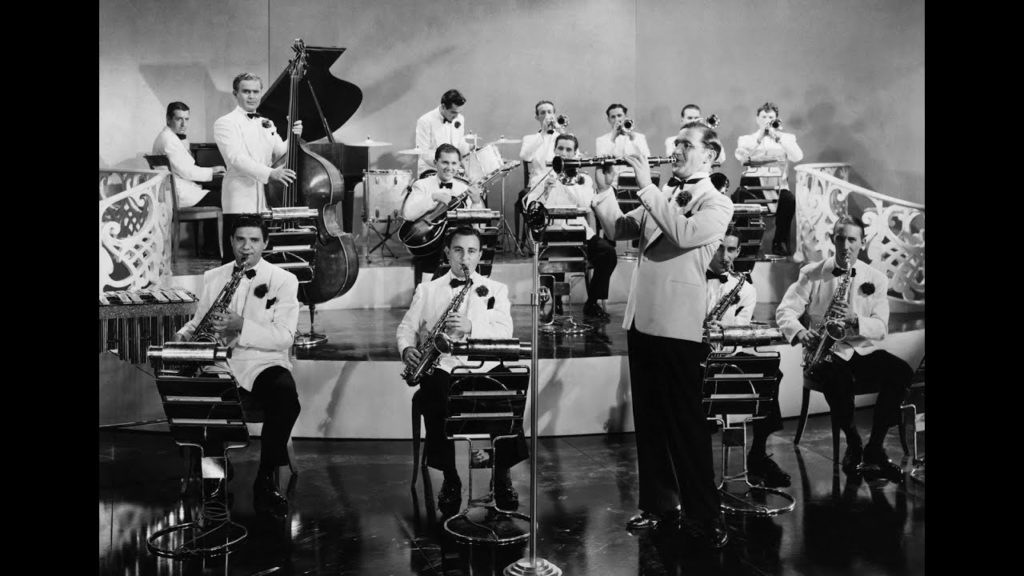
Nights Out.
I’m sitting here writing the Nowhere story in a town that is not my home, in a borrowed apartment surrounded by thousands of pages of Halberson’s notes that he wrote in a rented room, far away from his home, surrounded by the same, exact pages. Both of us are immersed in Nowhere, New Mexico (and maybe you are too), and both trying to figure out what, if any of it, is real.
Halberson’s slanted handwriting on hamburger sacks from The Dipsy Doodle and Bannock’s. On bar napkins from Las Lunas and Polly’s and The Brick. On a receipt from Kenton’s. According to the outside world, those places never existed. In the scattered piles of memories and thoughts, unburdened from their suitcase tomb, is the story of Nowhere and the real people who lived there. The mystery is all around me.
It’s Chapter 6! Where is the villain? Where is the conflict? Here. Here is the conflict! It is all around me! Where is Nowhere? Where has it gone?
We’re dealing with two eras and two authors. Separated by time, but studying the same information.
In November of 2021, this little mid-century modern apartment has been provided to me by our friends Kim and Brent who operate the Intermission Bookshop in downtown Brownwood, Texas.
Hemingway had Sylvia Beach. I have Kim and Brent Bruton.
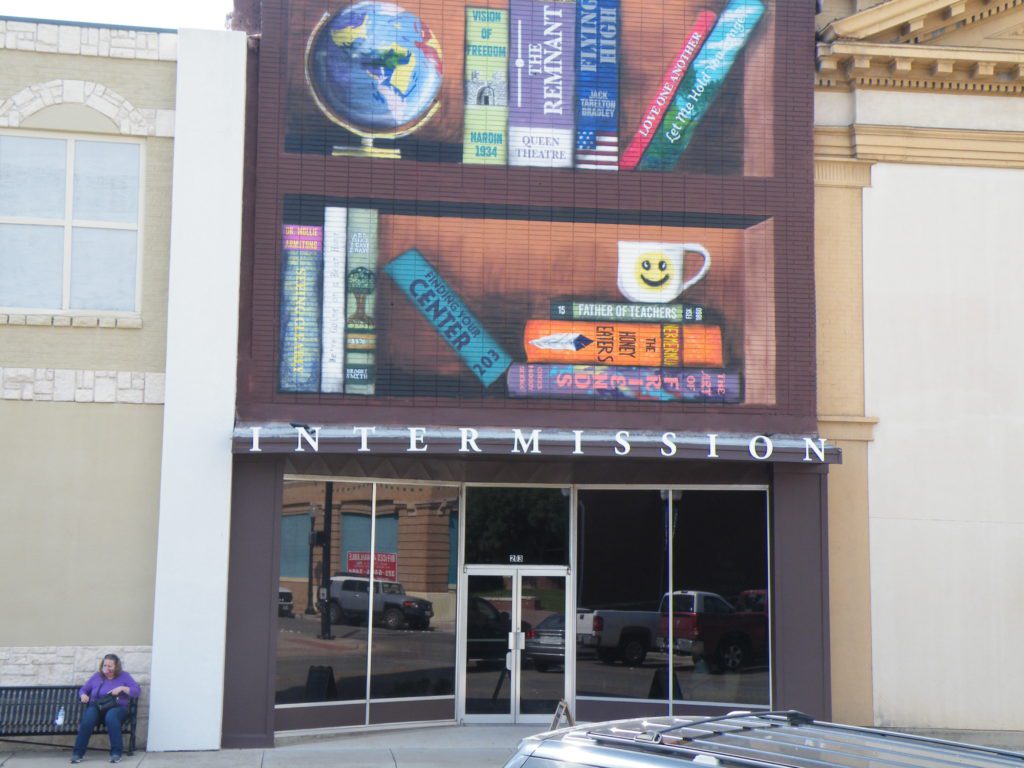
If you don’t know who Sylvia Beach is, definitely look her up. I can see the top of the Bruton’s bookshop out my front window. I offered to rent the room here because it is walkable from everything, and it fits my needs when I write—needs which can be different for every book. In a sense, writing a book set in the mid-century, particularly the 50s, can be difficult, but, sitting among all these notes, in this unique mid-mod apartment, and living a life so similar—uncannily similar—to Ken Halberson’s at the time… the writing is easier. Listen, I believe I could write dispatches from trenches if I had to, just like Ken Halberson did in a couple of wars, but both Ken and I share this as well, we both sought suitable accommodations for our foray into Nowhere.
Ken Halberson got to investigate Nowhere, New Mexico by the largesse of people like Leon and Carol, John Lee Danner, Mr. Copeland, and old Abe Mendoza, who all helped him along the way. For me, Kim and Brent offered to let me use the room free of charge, and I couldn’t believe it when Kim told me. Ken got some help with a room too, but at this point in the story, he didn’t know that.
As I write this, I am drinking a beer I picked up just now by walking the half block from the Bruton’s apartment to Pioneer Taphouse. I waded through the battlefield rubble of Ken Halberson’s notes stacked here and there on every counter and table, spread across the floor, then to the door and out, turn right and then right again and it’s twenty yards to the taphouse. Ordered a to-go porter in a plastic cup, then the half-block back to the writing. Later this afternoon, I’ll embark on a little, private pub crawl with my wife to make sure I stay in the Ken Halberson mindset as I share Ken Halberson’s night out. I’m doing the pub crawl because Ken did it. Do you get it?
***
Ken is writing in his little room off of Finch and Adams in downtown Nowhere. He’s surrounded by these sheets and scraps. Some time has passed since that night a week ago with John Lee Danner when he finally got to meet Mr. Copeland and dance with Kate Laird at Las Lunas. That night, Copeland offered him the use of a small efficiency apartment in the heart of downtown, and Halberson agreed to it so long as Mr. Copeland agreed to let Edward Kramer Thompson of LIFE magazine pay for it. Except for the automobile Ken had bought, Ed Thompson was making out like a bandit on expenses for this assignment. Copeland promised he’d send the bill to LIFE, but he never would. Halberson spent the next day moving to his new digs, and, with the blessing of Leon and Carol, became a resident of downtown Nowhere, New Mexico. No longer an itinerate passer-through, Ken is a local. His new apartment is a low, one-story affair (just like mine,) in a row of such apartments, and he’s one block off Mockingbird, the main entertainment street in downtown. Just a short stroll, one block up and four blocks over to the west, and he can be in the Bistro District on Chestnut for coffee or a cocktail. In 1954, Mockingbird is lined with chic shops, bars, dining rooms, theaters, and entertainment venues. Bannock’s and Kenton’s are up the street to the east, and Bix’s is two blocks over atop a hotel on Walnut. We’ll get to Bix’s soon.
Anyway, Ken is writing too, and he has the same notes—the same tangible, physical pieces of paper—scattered all around him as he writes. He pours himself a drink from the bottle of Jim Beam that he picked up the night before at Desert Flower Spirits. He’s writing about the night with Kate at Las Lunas.
That night had gone wonderfully. Like a dream. Not a date, per se, but perhaps a chance meeting (if there is such a thing in Nowhere) that evolved into a sort-of impromptu date. There would be no doubt that by later in the evening, those who saw us knew it… Kate and I were together.
But that night, early on, I thanked Mr. Copeland and John Lee for the hospitality as they excused themselves, and John Lee told me not to worry and that he didn’t live too far from here and it was a gorgeous night for a walk, and he’d have someone pick up his car at the Vacation Motor Inn in the morning. Everyone was smiling and happy, and the feeling throughout Las Lunas that night was one of a kind of enchanted electric bliss or a shared joyous reverie. Goodwill toward men and so forth as the music played and the dancefloor radiated with smiles and laughter.
Kate and I had drinks and since I hadn’t eaten, we ordered a tray of snacks—crackers, cheeses, fruit, and cured meats—and we grazed as we talked. We smoked cigarettes, laughed, and generally tried to peer into one another’s souls. And, most importantly, we danced like no one else existed and agreed to a real date just a few nights hence. This time at Bix’s for the Spring Celebratory Ball.
Kate’s was the most natural beauty I’d ever laid eyes on, her milk-white skin and cornflower blue eyes, and let’s just say that as a journalist who’s had the experience of running in some pretty glamorous circles, I’d laid eyes (and perhaps hands) on some elite beauties. But Kate radiated a sense of kindness and authenticity that I have found rare in the upwardly mobile economically booming thrall of post-war America. Her breathy voice and easy laugh charmed me. She was as natural as a wave on a secluded beach or a mountain flower. I didn’t get the feeling, as I did from many women outside of Hollywood, that she was recruiting a husband. She was just Kate, and although I did pick up signs that she liked me, it wasn’t some kind of insta-love or smarmy seduction that would have alerted me to a possibly nefarious plot. (Don’t think that it hadn’t occurred to me that those who wanted to influence my actions and decisions concerning my job in Nowhere, might have set up a ‘honey pot’ sort of situation for me. It did occur to me.) The feeling I got from Kate was that giddy, heart-soaring infatuation that is near-on impossible to fake (and in this case was mutual,) and my awkward attempts to keep Kate talking often made her laugh, her eyes twinkling and glowing with moisture. She was as taken at the moment as I was. Magical.
“Are you a reporter right now, Mr. Halberson, or are we too grownups chatting?”
“Definitely the latter.”
“Then I should not be doing all the talking, and you should not be quizzing me like I’m the Princess of England here on a tour.”
“You’re right,” I said. “Let’s talk about two grownups going on a real date.”
“That would be an acceptable topic,” she said.
I was not familiar with Nowhere’s social calendar, so I asked Kate when and where would be an appropriate first date, and she said, “Hands down we simply must go to the Spring Celebratory Ball.”
“A celebratory ball? What is it that we’ll be celebrating?”
“IF you ask me on a date, I’ll tell you.”
“I’m asking you on a date,” I said.
She just looked at me. Waiting. Head down. Hands folded.
“Will you go on a date with me, Kate Laird?”
“I will.” She exploded in a smile for the ages. Giddy. Excited.
“Ok, then. What will we be celebrating?” I asked.
“We’ll be celebrating Spring, silly! It’s in the title.”
I laughed. “Fair enough. What sort of affair is it?”
“Full glamour,” Kate said, leaning forward in rapt excitement. “I’m talking about ball gowns, white gloves, furs, and cufflinks.
(I made a mental note to get cufflinks.)
“You can wear your new tuxedo. I heard you won it fairly in mortal hand-to-hand combat with Rose Kenton, and don’t you worry but that I’ll dress appropriately too. You’ll get me a corsage, of course, since I’m teaching you the acceptable protocol for such an evening, and you’ll pick me up promptly at 7 p.m. We’ll dine formally before the affair, preferably at Leopold’s which is downtown, a gin and steak establishment of the finest quality, and just a few steps from Bix’s, which is housed in the upper floor and rooftop of the Downtowner Hotel.”
***
I’m taking a break from the bottomless fount of minutia in Ken Halberson’s notes—describing the infinity pool that is Nowhere, New Mexico—because my wife has joined me in town for the evening and we’ve planned a date night out. Our parallel pub crawl. Later this evening the 10 Mile Wine Bar down here is having a Thanksgiving potluck, and my wife has signed us up to bring a few dishes. She’s prepared sweet potatoes and banana bread and uses the oven at the apartment to cook them and keep them warm.
In the afternoon we walk the block over to the Intermission bookstore where our patron Kim is holding a book signing with two visiting Texas authors. The bookstore is decorated for the holidays and in one corner is a big Christmas “tree” made out of boxes pasted with pages from literature. A table is prepped for the reading with books to autograph optimistically piled high, and as patrons mill around, we walk through the gorgeous, gravity-defying “book tunnel” (a must-see) into the back room which houses most of the books for sale. We peruse the books then drift back toward the main room and, after meeting the visiting authors, we take up seats on a comfortable sofa to await the reading.
The authors are enjoyable and engaging and swapping stories about their paths through the mainstream publishing system, something not completely foreign to me, but different, nonetheless. Then they discuss their books, and each reads a selected segment of their novels for the audience.
I include this detail for a reason. This chapter is as meta as it can be, so I would be remiss in not including this scene of me sitting and listening to authors read from their newly published books so I can write about it in a book about me writing a book about a book another man was hoping to write in the middle of the last century.
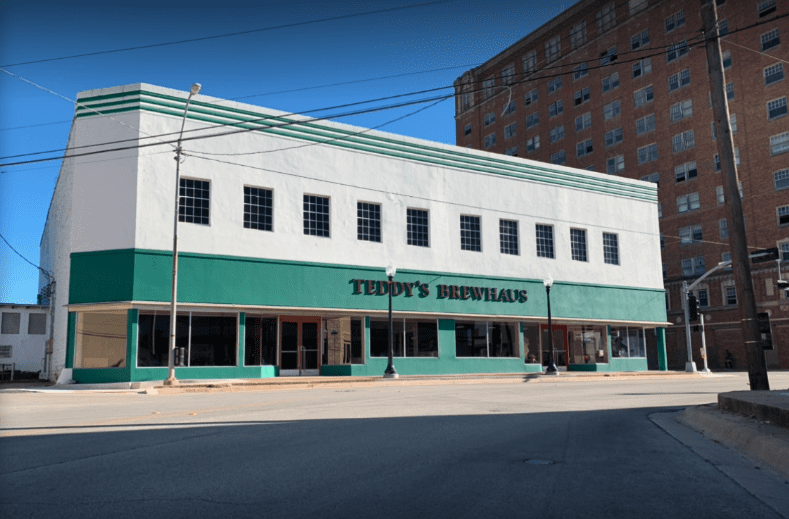
We start the evening (actually the late afternoon, since it is now only 4:00 p.m.) at Teddy’s Brewhaus, a full-fledged brewpub and restaurant on the corner of Fisk and Baker, a half-block up and a block over from the apartment. Teddy’s is a huge operation in a completely restored 136-year-old building across from the historic Brownwood Hotel high-rise. The 12-story hotel is set to be renovated as part of the downtown revitalization and most everyone is excited about that prospect, but the building that is now Teddy’s, across the street, served as everything from a mercantile shop in the late 1800s to a saddle shop and hardware store over the last century, and those historical ghosts inform the design of the Brewhaus. Teddy’s is an homage to Teddy Roosevelt and pictures and murals of the 26th President adorn most of the walls and facades of the building. There are several rooms in the sprawling complex, everything from large dining rooms to cozy and comfortable seating areas, and out the back is an entertainment venue and beer garden with picnic tables and gazebos cut from feed storage silos. Teddy’s, as the name ‘Brewhaus’ suggests, brews some fine beers, and I order my favorite, the curiously named “Fleck U” or “FleckU,” which is a dark, Czech lager. My wife orders her usual, the Appleonia, a pale beer, sweet, with hints of apple and spice. Wes, the brewmaster, always friendly and hospitable, stops from his work among the huge brewing vats and apparatus to wave and shout “Hey, Bunkers!” and not long after, Jeff the boss, chewing on an unlit cigar, comes by to say hi and ask me how the writing is going.
After the beers at Teddy’s, we walk the block down Baker Street, past the barbershop, and the Tres Leches Bakery across the street, to Pioneer Taphouse, our regular hangout. If you’re trying to keep this straight in your mind, my little apartment is directly behind Tres Leches, a Mexican bakery with fantastic burritos, street tacos, and baked goods. Pioneer is catty-corner across the street from the bakery and is quite empty now compared to how busy it will be later tonight. The Taphouse, like many of the buildings I’ll mention downtown, is ensconced in an old bank building. It seems like half the buildings downtown housed a bank at some time or another. When you come to the front door of the taphouse, engraved on the floor in front of the door it reads “Brooke Smith & Co. Bankers.” I cannot help but imagine as I study these old buildings the life they’ve lived, and how they might have been back when Halberson flew to Albuquerque and met Abe Mendoza. There was life here in Nowhere, Texas then, too.

On this day, the front door of the taphouse is propped open as a tribute to the fine weather, and inside, under the watchful gaze of a huge buffalo head (that for a short time a year ago wore a surgical mask as a form of gallows humor during the height of the pandemic.) Industrial chic tables and high-tops are spaced around the place, leading up to a bar fronting a wall with dozens and dozens of beer taps. Behind and above the taps there is a loft for more private conversations. We order Texas craft beers and sit at a high-top and talk.
***
It’s the day before Ken’s big date, and sixty-seven years earlier than the events of the previous paragraphs.
Ken Halberson is nervous about his night out with Kate and is drinking
whiskey and double-checking and triple-checking his tuxedo and the cufflinks he just bought from Kenton’s when there is a knock at the door. He recognizes the man as the trumpet player who plays and sings like Harry James.
“Verne Powell,” the trumpeter says. Only he didn’t say that. He said another name, but Ken later dubs him Verne. You’ll get that story in a minute. “Quite pleased to finally meet you. I’ve heard so much, but I don’t heed gossip so never you worry. Don’t mention me in your story, if you please, and if you do give me a fake name like Duke or Monty because I still owe money to some bad fellows back in Trenton and some other bad hombres over in the Bronx. I don’t think they read, because they are really, really stupid, but in case they do I’d hate to get murdered just because I’m fiscally irresponsible and you’re a popular scribe. And make sure that in your story you compare me positively to Harry James and use the phrase that my tone is “like a bullet hitting a bell” because that’s how they described Bix Beiderbecke’s sound. He’s my favorite, Bix is, and the greatest that ever played. He played the cornet though, so get that right in your story. I play the trumpet. Similar, but not the same. But I’m not telling you how to write, and you don’t tell me how to owe money to murderous psychopaths and we’ll get along fine. Anyway, I told Kate I’d look after you and make sure you’re prepared for tomorrow night, and so long as I don’t get murdered for overdue vig—you know, the confiscatory interest on illegal loans—we should be fine.”
“That’s some introduction,” Ken says. He invites Verne in and shows him the tuxedo hanging on a hook on the back of the door.
“That looks fine. Just fine,” Verne says. “Looks like the laundry got Rose Fenton’s predacious handprints off of it. Did you get a corsage?”
Ken nods. “I ordered it. I pick it up tomorrow afternoon at Amy’s Floral Shoppe over on Chestnut.
“Good. Cutting it close, but good. Don’t mess this up, F. Scott. Have you washed and waxed the car?”
“Got it done this morning. Just hoping there’s no rain or windstorms. If the weather holds it should be a beautiful night.”
“Are you prepared in case we get attacked by some irate mobsters over lingering debts I know nothing of?”
I laughed. “I’m a marine and pretty handy in a scrape.”
“Looks like you have all the bases covered. We should go drink a toast to preparedness and the blooming of vernal love.”
“Let’s not get ahead of ourselves, ‘Verne,’ which is, officially now mind
you, the name I’m going to call you in the story.”
“I like Verne. It’s Spring?”
“It is,” Ken said.
“Then we drink.”
***
Back to the future. The aforementioned Pioneer Taphouse is a gathering spot for a lot of folks, students from nearby Howard Payne University, downtown workers, especially some who work at the nearby 3M plant, along with other regulars and some of them start to wander in right before five. One of them is Ben, the anchor of Baker Street, or, as I like to call him, BEN OF BAKER STREET. He’s a large man, good-natured, and he reminds me of the George Wendt character in the original Chevy Chase movie Fletch. George Wendt (Norm of Cheers fame) plays Fat Sam in Fletch, and obviously since Ben is a regular in a bar and everyone cries out “BEN!” when he enters, he should remind me of George Wendt in Cheers, but he reminds me more of Wendt in Fletch. Fat Sam is a guy who sits in a chair on the beach every day. Just sits there talking to people. He seems to be a harmless guy hanging out on the Los Angeles beach, but it turns out he is the biggest drug dealer in the area. I tell Ben that he reminds me of Sam and that I imagine him as a notorious gangster disguised as a happy-go-lucky regular at the local bars. “One day,” I tell him, “I’m going to write a book where you are a surprise murderous gangster.”
This is not that book.
Another regular is my friend Kevin. I have no clue what Kevin does. He might work for 3M or he might be an astrophysicist or he might clean gutters. No clue. Kevin could do all three. No idea. Kevin is probably a drunk, definitely a troll, and something like a savant, and there is no telling what will come out of his mouth. He’s into a million different things, investments, crypto, buying bulk bourbon, and whatever else catches his interest. He is just as likely to preach that Texas Bourbon is the next great investment scheme as he is to tell us that we need to work together to market some kind of shirt with a battery bank or Wi-Fi or some shit built into the collar. On this day he’s telling us about his infatuation with the singer Jewel, in great detail, and he goes into a long story about her life and everything he’s learned by stalking her online. Once Kevin gets drunk, he fist-bumps everyone, even strangers, but especially when he zings you with a one-liner. He fist-bumps. Or, when he sees a stranger. Then the fist bump comes out. One night we were all at Stone’s Grove (more on that place soon,) and
Kevin was drunk and kept trying to fist bump the musician who was singing and actively playing the guitar. The guy was a good sport about it and would stop strumming long enough to fist bump Kevin every few minutes. You could measure Kevin’s blood alcohol content by the number of fist bumps per five minutes.
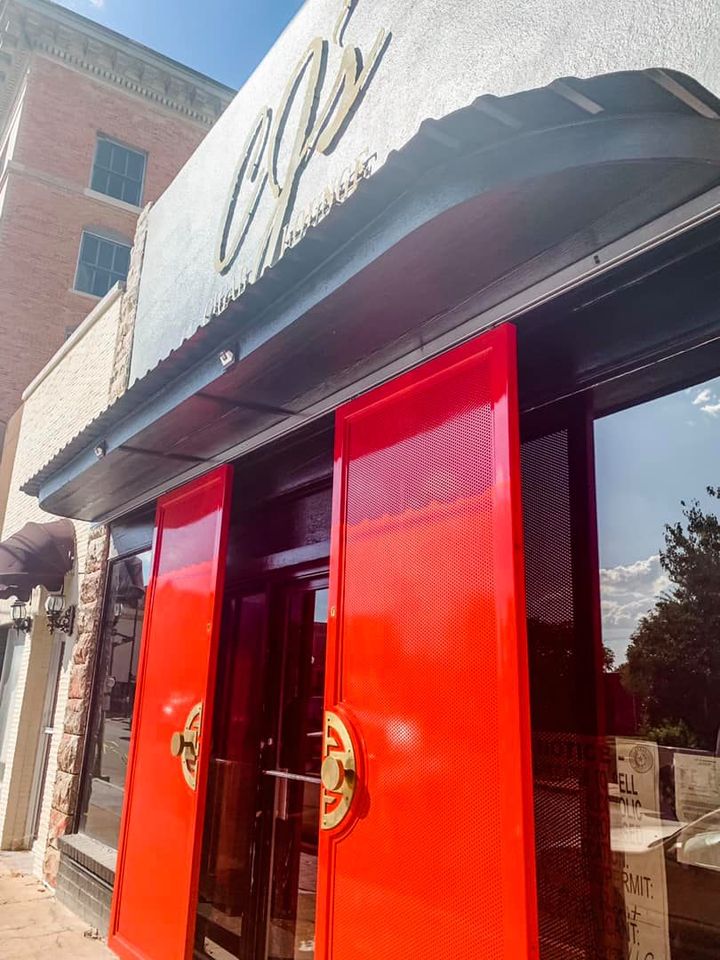
A few of the regulars come in, and as is often the pattern, after a beer we all migrate next door to CJs Cigar Lounge, a comfortable spot to relax with a whiskey and a cigar. The 3M people are talking 3M stuff, which is boring as all hell, but you have to pay attention if you are an outsider, because in the middle of some mind-numbing discussions of supply chain problems, spreadsheets, and crates of blue painter’s tape and gossip about who said what to whom, someone will drop a tidbit like, “We’re all going in on a bourbon barrel purchase from a distillery,” or “there is a gun auction for $35 a spot and last time I won an AR-15,” or “there’s going to be a poker night.” All of the best scuttlebutt happens unexpectedly and is buried deeply in the mind-numbing 3M conversations and can surface without warning and if you miss it, you missed it forever, so I’ve learned to keep one ear out for juicy intel.
The drinks are just now starting to warm me up and I’m feeling good and getting hungry and I’m hopeful about the rest of the night. I hope this isn’t confusing, because right now we’re going back to 1954.
***
Verne and I walk over to Polly Wannacracker’s, and it was my first time in the place. Polly’s is more of a clubhouse than it is a bar or cocktail lounge. As a bar, it is bad. As a cocktail lounge, it is bad, and as a smoking lounge, it is bad. I suppose as a clubhouse for men to meet and drink and play games and gossip, it’s just fine. There is nothing in it that would commend it to women. It’s all exposed wood slats and tobacco juice and no floorboards or trim or paint. Wires run threadbare through rafters and beams and the lighting is poor and it seems there might be bats in the building, but no one seems to mind. There is a woodburning stove in the middle of the room, but it is warm outside and in Polly’s, and the wood burner isn’t lit. Tables are scattered around, somewhat haphazardly, and men play dominoes and cards at the tables, and waiters circulate delivering drinks and clean ashtrays. The smoke is heavy in Polly’s, and we walk to an empty table and sit down and light cigarettes to add our offering to the smoke gods. A waiter arrives and asks, “What can I bring you?”
“I’d like a beer,” I said.
Verne nodded. “Beer for me too.”
“We have Manhattans right now,” the waiter said. “Beer cooler broke down.”
“Manhattans? That’s all?”
“That’s what we have.”
Verne laughed. “Then why did you ask what you can bring us?”
The waiter stood, stone-faced. “I’ll bring you whatever you want, so long as it is a Manhattan.”
“Two Manhattans,” I said.
We’d only just received our Manhattans when we were pulled over to another table of men who were debating about anything. Anything at all. In rapid-fire succession, they argue over the merits of owning a television (in an area that is too far away from anywhere to receive television signals,) Martian moon bases, whether this thing just now being called “rock and roll music” was from the devil, and if the Russians had some form of rock and roll music. I have to say I understand the attraction to hang out at Polly’s.
“You’re that writer fella,” one of the men said, and this sets off a debate about whether or not the Russians are planting propaganda in American magazines and if maybe I’m a spy from Russia. Everyone decides I’m not a spy, or not a very good one, and someone orders another round of Manhattans.
We pay our bill and Verne doesn’t try to beat me to the bill. He’s a musician and the first person to let me pay for just about anything since I got to Nowhere. Except for the car, of course. Our next stop is a few doors down and we walk into a place called Damiani’s Vault and Security. Inside is a counter and behind it, hanging on a long rotating chain-driven mechanism like they have in a dry cleaner’s shop, are furs as far as the eye can see.
“Is this a fur shop?” I ask.
“You’d think it was, but everything behind this counter is a secure vault. Like a bank vault, only more so. Furs are very expensive, and people don’t keep them in their homes. They come here and check them out for balls and dances and special occasions, and they bring them back the next day. They’re cleaned and serviced and stored here until the next occasion. You own your fur, but it lives here. I just thought you’d want to see this place.”
“I guess I never thought about it before since I’ve never worn a fur coat. Is this common in other places?”
Verne nodded. “Oh yes. Towns all across America have vaults like these. Usually downtown and near the most popular ballroom.”
“I guess I’m confused as to why this would be necessary. Is there crime in Nowhere?”
“Crime,” Verne laughed. “None to speak of. I mean, we’ve had small crimes I suppose. A few years ago, Marcel Eddings stabbed his brother Chaz over an argument about a horse they stole during the war. But they made up and nothing came of it. Wasn’t an arrest or a trial. I suppose if Chaz had died maybe something would have happened, but he just said someday he’ll stab Marcel back if he needs to and it’ll be even. But we don’t really have a crime problem.”
“So why the fur vault?”
“It’s a prestige thing,” Verne said. “A social ceremony. All the women coming down to pick up their furs and sitting around and chatting while they wait for their furs and bringing them back the next day and sitting around and gossiping about the night before while they wait to drop off their furs. You’d hate to be the man whose wife kept her fur at home with all of that going on.”
We stepped outside into a nice breeze, and the electric blue of dusk was spreading across Nowhere, and to the west a glorious, fading orange and red sky, and there was the distant honk of a horn, the buzz of traffic, and the hum of the streetlights as they came to life.
We cut across the street and entered a little Italian restaurant called Papa Ricci’s. It is exactly what you would expect in a little Italian restaurant named Papa Ricci’s, red-checkered tablecloths, a black and white checkerboard floor, red napkins folded neatly on tables, and green wine bottles in wicker baskets hanging from the ceiling. We’re seated and Verne orders a bottle of the red wine, and it comes in a big green gallon bottle in a wicker basket. We start to light cigarettes, but the waiter waves us off, rushes in, and hands us each a cigar. Mama Ricci herself doesn’t like cigarette smoke, he says, but her dead husband smoked cigars so she’s fine with those.
“I love this place,” Verne said. “Although I am gambling with my life eating in an Italian establishment, what with the people I owe money to.” He lights his cigar with a wooden match and then holds the match for me while I light mine, drawing in smoky infernal bliss.
“How did you come to be in Nowhere,” I said.
“John Lee wanted a world-class orchestra and brought me over a few years after this place got started and he heard I might be in a bit of a fix over… well, you know. Sometimes I gamble. Anyway, I used to play in his band before the war and I was always getting into some kind of trouble, and John Lee always looked after me. Musicians are like writers, I think, in that we tend to drink a bit
too much and to get into trouble.”
“Maybe so,” I said. “You’ve been here, what? Four or five years?”
“Something like that.”
“I’m surprised that Carol or John Lee haven’t set you up with someone. They seem to be quite the matchmakers.”
Verne laughed. “Well, they have introduced me to someone. I have a wife at home, thanks to them. Gorgeous lady, my wife, and very forgiving. She doesn’t like to go out very often. Afraid my former business associates might come and find me and shoot up the place. Not really. I jest, but she doesn’t like going out very much. She’ll be at the Spring Ball though, dressed to the nines so you can meet her then. Ginger’s her name.”
“I’ve been asking everyone,” I said, “so I might as well ask you. What’s your theory of the origins of Nowhere? How did this town get here and what is its back story?”
Verne puffed on his cigar, a pleasant smile on his face. He poured wine into both of our glasses and then puffed some more.
“Well, I’m sure you’ve heard John Lee’s torn continuum theory? And all the gold theories, of course. I like the “we’re all dead and this is a sort of heaven on earth,” theory. Have you heard that one? Like maybe I was killed by those gangsters in Trenton and we’re here in heaven drinking Mama Ricci’s wine?”
“I have.”
“Ok. Myself, I tend toward the Occam’s Razor kind of thinking. Do you know Occam’s Razor? That concept that when we’re faced with competing or varied hypotheses, the correct one is probably the one requiring the fewest assumptions. I don’t know if I’m saying it right, but do you know this kind of thinking?”
“I do.”
We’ve been sitting and not drinking wine because our glasses are near empty, so the waiter comes by and uncorks the bottle and fills our glasses to the very rim. “Will you gentlemen be eating?”
Verne nods. “Yes. Just bring us the special of the day. Whatever that is. Two of ‘em. That ok with you, Ken?”
“It is.”
We sip the wine, trying not to spill on the tablecloth, and it is good wine. A little sweeter than I like, but not by much, obviously fresh and probably made right here in the back room. Now I’m wondering where they get the grapes, or if maybe Mama Ricci has grapes growing in her backyard.
“So,” I said. “Occam’s Razor?”
“Yes. Occam’s Razor. I think the simplest answer is that Lew Bonaventure found gold. Why is that so hard to believe? This is just a boomtown and there’s not much more to it. I mean, I’m close with John Lee Dannon, as you know, and despite his flamboyance and his tendency to freelance with the truth, I think that’s what he thinks too. But I believe the Lew Bonaventure story because… well… I think we all need to believe in it. I can’t imagine what would happen to this town if it came out that it was a lie. Or, that it was all based on a lie. There needs to be gold, here. So, I reckon there is.”
“Based on a lie? Are you talking about the theory that one of Hoover’s G-men came to town and then, to cover up his laziness or lack of willingness to go back home that he made up the gold story to fool his bosses?”
“Yeah. That one. The ‘Smith Theory.’ Some people are big on that one, but they are generally the cynical types. That’s a crazy idea, and there are some folks here—Like Carol—who believe that. But I can’t.”
“Well, have you ever met Lew Bonaventure?”
“No. Not in person. But John Lee did. Or he said he did. Lew is a private person, and he lives far out on Northeast. A big mansion out there, as befits a found-gold millionaire. He doesn’t come to town much, or at all. John Lee says he orders all of his groceries and supplies delivered, and that he manages the gold hoard so that too much of it isn’t released into the supply at any one time. That’s the story and it makes sense. I’ve driven out on Northeast and seen Bonaventure’s mansion. And I don’t think it’s as crazy as Martians or lazy G-men.”
I drank my wine and sat quietly for a while, thinking. The wine was good now. Really good. Just the right sweetness to make us keep drinking it. Verne was watching me, and I guess he was thinking too.
“Can’t think of another question?” Verne said. “Not much of a journalist, I’d say.”
“I guess I’m waiting for the villain to appear in this story. Or some sort of conflict. It really can’t be much of a story if there isn’t a villain or some conflict.”
Verne puffed on his cigar. “Perhaps if you cannot discover the villain in a story, then you are the villain.”
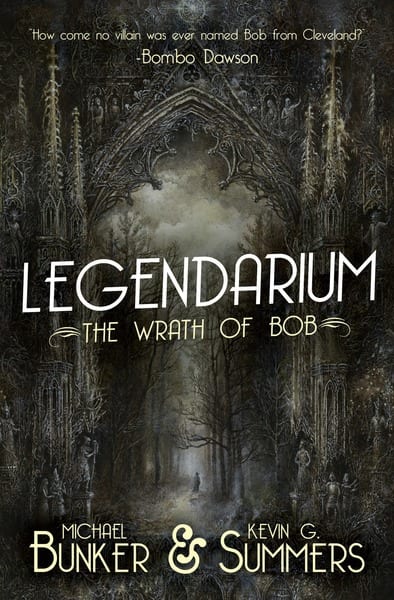
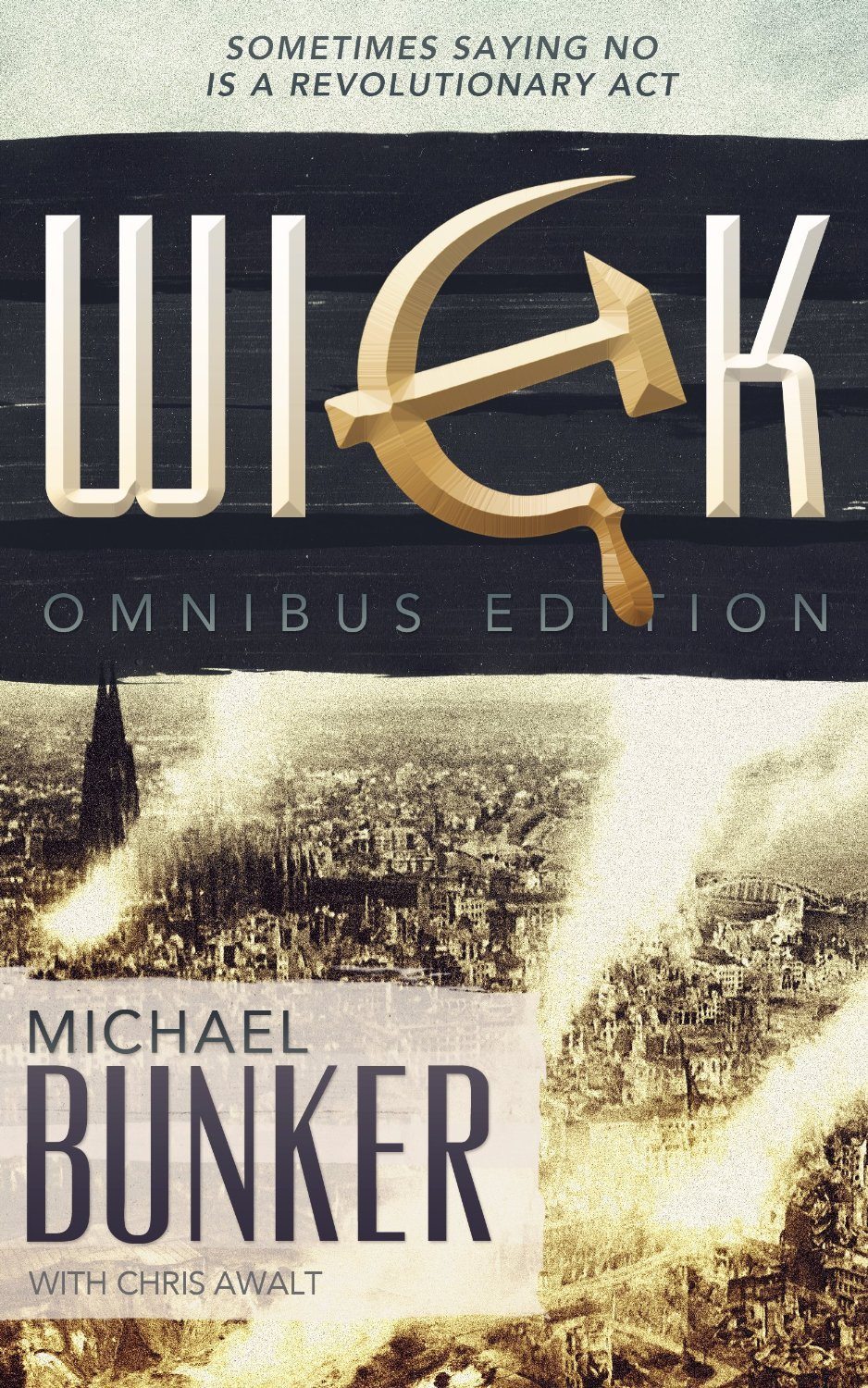
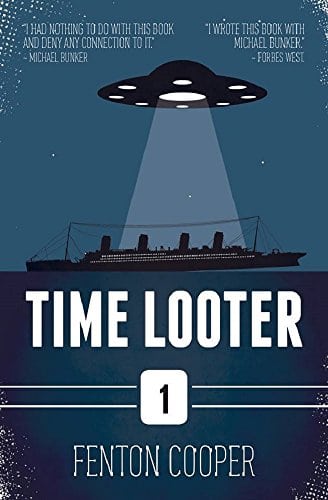
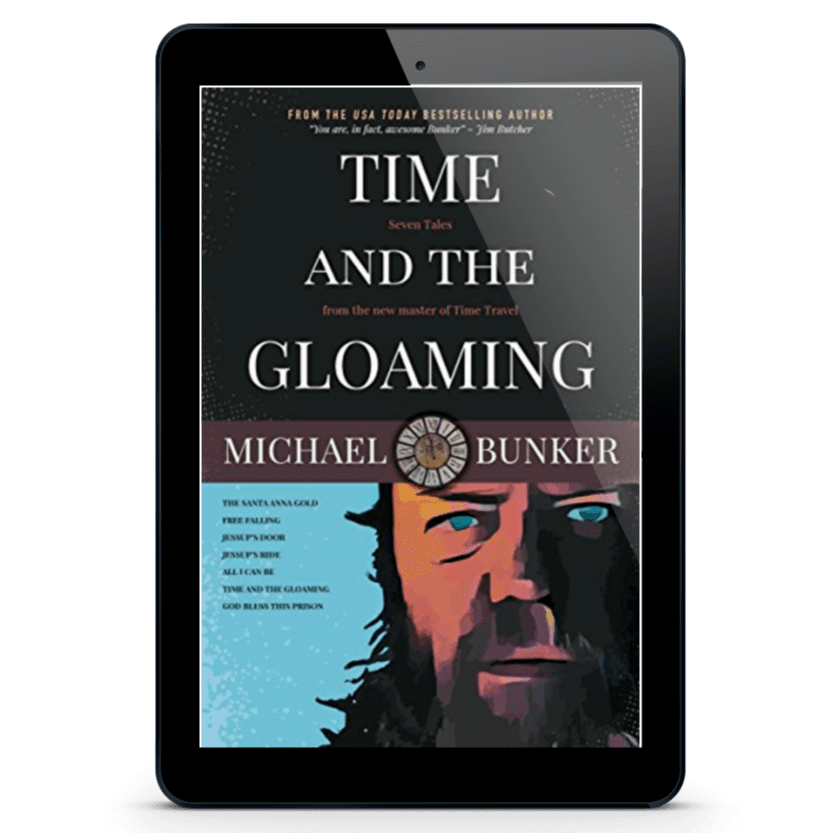
Leave a Reply